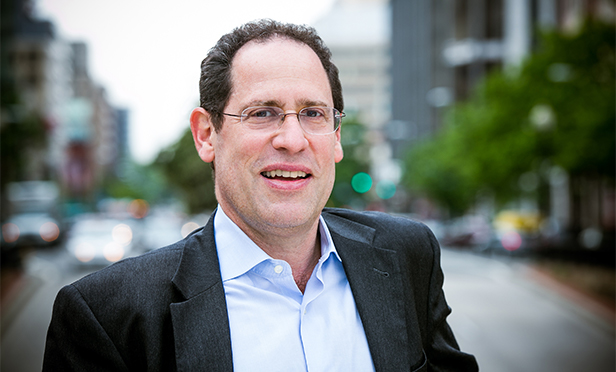 CC BY-SA 3.0, Link" width="616" height="372"/>
CC BY-SA 3.0, Link" width="616" height="372"/> NEW BRUNSWICK, NJ—A “radical shift in power and responsibility” from national governments to metropolitan areas is taking place in urban redevelopment, says Bruce Katz, keynote speaker at the New Jersey Future Redevelopment Conference earlier this month here.
Katz, who was a senior advisor to the secretary of Housing & Urban Development in the early part of the Obama administration, is the author of The Metropolitan Revolution and co-author with Jeremy Nowak of The New Localism, which focuses on how to best revitalize urban environments in an era of limited government support.
“There's an enormous amount of economic insecurity and cultural anxiety out there, in the United States, in Europe,” he said, citing the Brexit decision and the rise of economic nationalism across Europe.
Amazon has “sent a signal” with its HQ2 project that the company “will only go to a place that is transit-connected, that is urban, a complete reversal of decades of sprawl and decentralization,” he says. “The market wants agglomeration, co-location, concentration of assets.”
Cities are very innovative places because of density, Katz says. “You have the whole ecosystem, the universities, the companies, the startups, the scale-ups, the incubators, the investors, all within a relatively small geography, and that's how innovation occurs today,” he says.
Power is shifting to problem-solvers, Katz argues, who are increasingly located in cities. Centralized national governments and their agencies are not ideally suited to deal with the problems of 21st century development, he says.
“If you take any of the economic or social or environmental challenges that we face in this country or in other mature economies, and you ask who is trying to crack at that problem, I guarantee you it's local and metropolitan,” he says. “National governments, whether they've been captured, hijacked by partisanship or not, are not quite capable any more of dealing with the complexity of issues before us.”
Innovation solving problems of growth or governance or finance needs to be captured, but it's not coming from Washington, he says.
“No one is waiting for Washington to do anything remotely intelligent any more,” says Katz, the inaugural Centennial Scholar at the Brookings Institution. “Washington has become a health insurance company with an army. A small community foundation in this state has more discretion than a cabinet secretary.”
In his new book, The New Localism, Katz looks worldwide for effective models of local redevelopment. He finds them in diverse locations from Pittsburgh to Copenhagen, Denmark.
Pittsburgh's revival began after the Three Mile Island nuclear accident in 1977, when companies trying o clean up the damaged reactor turned to Carnegie Mellon professor Red Whittaker, one of the first roboticists in the US, whose team “figured out how to make robots mobile.”
“The reason why innovation around robotics, artificial intelligence and machine learning began to emerge in Pittsburgh,” says Katz, was the confluence of universities in the Oakland district of Pittsburgh. “If you're a networked economy, what you want is proximity and density of smart people, faculty, students, researchers, entrepreneurs, investors. That's what you have in Pittsburgh.”
Because of investment by the philanthropic and business communities “in a sustained way, Pittsburgh has become a playground of innovation,” Katz says.
As a result, “a whole bunch of global companies are coming to Pittsburgh without tax incentives, without tax abatements, because they have to be there. They have to be near the 'secret sauce' if they're going to keep their competitive edge,” Katz says. “Google and Uber and GE, they're all in Pittsburgh and they're all hugging that magic square mile of Carnegie Mellon and the University of Pittsburgh. That's what you have to build in New Jersey.”
Metropolitan areas need to connect all the elements of such a system, Katz says. “There isn't one agency sitting in Trenton or Washington, DC, that can deliver this,” he says.
Urban areas also need philanthropies willing to take risks with their investments, he says, because the federal government is not taking those risks.
Another example of extraordinary partnership between the public sector, business, and nonprofits is Copenhagen, Denmark, according to Katz.
In the late 1980s and early 1990s, he says, civic leaders realized they needed to build a modern subway system without raising taxes. Copenhagen created a publicly owned corporation that was given all of the public land in the town's harbor and a business district, which redeveloped the core of the city. The corporation took an equity position in the deals, and over the course of 30 years of leases and land sales, the revenue from the public asset management has serviced the debt on “a 21st century subway system,” Katz says. “They're doing this from the management of what the government owns. The message from Copenhagen is they're in it for the long haul. They're managing this like a private corporation so they can get the maximum yield and invest in something which is going to have enormous returns for the city.”
In contrast, Katz says, most US cities would say their asset disposition strategy is mainly based on selling properties tactically to cover periodic budget gaps.
“We are the wealthiest country in the world,” Katz says. “We just haven't been able to connect capital to what we need to invest it in. Let's figure that out at this level, and then in 10 or 20 years, if Washington ever becomes sane and sensible again, then let's reverse engineer national policy. Let's have them do what we've told them to do. That's a representative democracy.”
© 2025 ALM Global, LLC, All Rights Reserved. Request academic re-use from www.copyright.com. All other uses, submit a request to [email protected]. For more information visit Asset & Logo Licensing.








